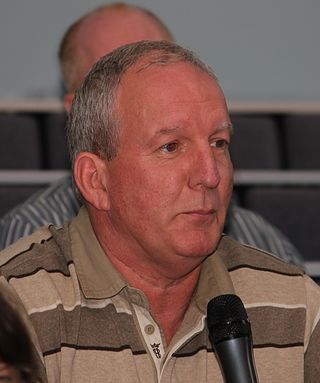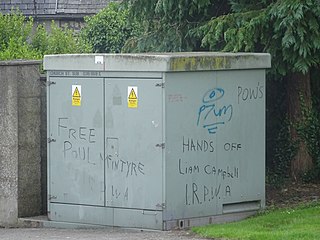Related Research Articles
The Real Irish Republican Army, or Real IRA (RIRA), was a dissident Irish republican paramilitary group that aimed to bring about a United Ireland. It was formed in 1997 following a split in the Provisional IRA by dissident members, who rejected the IRA's ceasefire that year. Like the Provisional IRA before it, the Real IRA saw itself as the only rightful successor to the original Irish Republican Army and styled itself as simply "the Irish Republican Army" in English or Óglaigh na hÉireann in Irish. It was an illegal organisation in the Republic of Ireland and designated a proscribed terrorist organisation in the United Kingdom and the United States.

The Omagh bombing was a car bombing on 15 August 1998 in the town of Omagh in County Tyrone, Northern Ireland. It was carried out by the Real Irish Republican Army, a Provisional Irish Republican Army (IRA) splinter group who opposed the IRA's ceasefire and the Good Friday Agreement, signed earlier in the year. The bombing killed 29 people and injured about 220 others, making it the deadliest incident of the Troubles in Northern Ireland. Telephoned warnings which did not specify the location had been sent almost forty minutes beforehand, and police inadvertently moved people toward the bomb.
Michael McKevitt was an Irish republican and paramilitary leader. He was the Provisional Irish Republican Army's Quartermaster General. Due to the Provisional IRA's involvement in the Northern Ireland peace process, he formed the Real IRA in protest. His role in the Real IRA led to him being convicted of directing terrorism as the leader of the paramilitary organisation.

Robert Storey was a Provisional Irish Republican Army (IRA) volunteer from Belfast, Northern Ireland. Prior to an 18-year conviction for possessing a rifle, he also spent time on remand for a variety of charges and in total served 20 years in prison. He also played a key role in the Maze Prison escape, the biggest prison break in British penal history.
Thomas Murphy, also known as Slab, is an Irish republican, believed to be a former Chief of Staff of the Provisional Irish Republican Army. His farm, in Ballybinaby, Hackballscross, straddles County Armagh and County Louth on the border between Northern Ireland and the Republic of Ireland. In December 2015, Murphy was found guilty on nine counts of tax evasion following a lengthy investigation by the Criminal Assets Bureau of the Republic of Ireland. In February 2016, Murphy was jailed and sentenced to 18 months in prison. One of three brothers, Murphy is a lifelong bachelor who lived on the Louth side of his farm before his imprisonment.
Thomas McMahon is a former volunteer in the South Armagh Brigade of the Provisional Irish Republican Army (IRA), and was one of the IRA's most experienced bomb-makers. McMahon was convicted of the murder of Lord Louis Mountbatten and three others off the coast of Mullaghmore, County Sligo, in the west of Ireland.

Conor Terence Murphy is an Irish republican Sinn Féin politician, who has served as Minister for the Economy of Northern Ireland since 2024. He has been a Member of the Legislative Assembly (MLA) for Newry and Armagh since 2015, having previously served as the Member of Parliament for Newry and Armagh from 2005 to 2015, observing the Sinn Fein policy of abstentionism.

The Hyde Park and Regent's Park bombings were carried out on 20 July 1982 in London, England. Members of the Provisional Irish Republican Army (IRA) detonated two improvised explosive devices during British military ceremonies in Hyde Park and Regent's Park, both in central London.
Eamon Collins was a Provisional Irish Republican Army member in the late 1970s and early 1980s. He turned his back on the organisation in the late 1980s, and later co-authored a book called Killing Rage detailing his experiences within it. In January 1999 he was waylaid on a public road and murdered near his home in Newry in Northern Ireland.

The Colombia Three are three men – Niall Connolly, James Monaghan, and Martin McCauley – who are currently living in the Republic of Ireland, having fled from Colombia where they had been sentenced to prison terms of seventeen years in 2003 on terrorism charges for training FARC rebels. The incident came during a crucial time in the Northern Ireland peace process and risked damaging it. The three were granted amnesty by a Colombian special court in April 2020. On 16 December 2022, the Special Jurisdiction for Peace revoked the amnesty citing that the trio had not fully divulged the truth about their trip to Colombia in 2001.

Liam Campbell is an Irish republican from Dundalk, County Louth. He was found liable under civil proceedings for the 1998 Omagh bombing, which killed 29 people.
Bernadette Sands McKevitt is a founding member of the 32 County Sovereignty Movement.
Colm Murphy was an Irish republican who was the first person to be convicted in connection with the Omagh bombing, but whose conviction was overturned on appeal. While awaiting a retrial on criminal charges, Murphy was found liable for the bombing in a civil trial, along with Michael McKevitt, Liam Campbell and Seamus Daly. He was subsequently cleared of criminal charges in February 2010.
Colin Duffy is an Irish republican, described by the BBC as the most recognisable name and face among dissident republicans in Northern Ireland. He was cleared of murder charges in three court cases involving police and army killings.
This is a timeline of actions by the Irish republican paramilitary groups referred to as the Real Irish Republican Army and New Irish Republican Army. The Real IRA was formed in 1997 by disaffected members of the Provisional IRA. Since July 2012, when Republican Action Against Drugs (RAAD) and other small republican groups merged with it, the group has been called the New IRA; although it continues to call itself simply "the Irish Republican Army".
This is a chronology of activities by the Provisional Irish Republican Army (IRA) from 1980 to 1989. For actions before and after this period see Chronology of Provisional Irish Republican Army actions.
Óglaigh na hÉireann is a small dissident Irish republican paramilitary group that took part in the dissident Irish republican campaign. The organisation started carrying out attacks around 2009 and was formed after a split within the Real IRA, led by Seamus McGrane.

The dissident Irish republican campaign began at the end of the Troubles, a 30-year political conflict in Northern Ireland. Since the Provisional Irish Republican Army called a ceasefire and ended its campaign in 1997, breakaway groups opposed to the ceasefire and to the peace agreements have continued a low-level armed campaign against the security forces in Northern Ireland. The main paramilitaries involved are the Real IRA, Continuity IRA and formerly Óglaigh na hÉireann. They have targeted the Police Service of Northern Ireland (PSNI) and the British Army in gun and bomb attacks as well as with mortars and rockets. They have also carried out bombings that are meant to cause disruption. However, their campaign has not been as intensive as the Provisional IRA's, and political support for groups such as the Real IRA is "tending towards zero".

Local elections were held in Northern Ireland on Thursday 22 May 2014, contesting 462 seats in all, as part of the wider local elections across the United Kingdom. The election took place on the same day as the European Parliament election. 1,243,649 people aged 18 and over were eligible to vote, and 51.3% of the electorate turned out.
The Disappeared are people from Northern Ireland believed to have been abducted, murdered and secretly buried, the large majority of which occurred during the Troubles. The Independent Commission for the Location of Victims' Remains (ICLVR) is in charge of locating the remaining bodies, and was led by forensic archaeologist John McIlwaine.
References
- ↑ "Man convicted of Real IRA membership". RTÉ . 2 March 2004. Retrieved 14 March 2007.
- ↑ "Omagh bomb organiser's drive ban". BBC News . 11 June 2009. Retrieved 26 June 2009.
- ↑ "Omagh bomb legal victory: The men behind worst atrocity of the Troubles". Belfasttelegraph.co.uk– via www.belfasttelegraph.co.uk.
- ↑ "Bail Denied for Real IRA Man Linked to Omagh Bomb". Associated Press. 10 April 2014.
- ↑ "Man charged with murdering 29 people in Omagh bombing". RTÉ News. 10 April 2014. Retrieved 11 April 2014.
- ↑ "Seamus Daly Omagh bomb case is adjourned". BBC. 6 May 2014.
- ↑ "Omagh bombing: trial of Real IRA suspect Seamus Daly will go ahead". The Telegraph. 17 February 2015.
- ↑ "Britain Drops Case Against Last Suspect in 1998 Omagh Bombing". The Irish Times. 1 March 2016.
- ↑ "Omagh: Seamus Daly Freed As Charges Dropped". Sky News. 1 March 2016.
- ↑ "Seamus Daly's family to launch campaign for his release : The Examiner Newspaper of Crossmaglen, South Armagh, Newry and Down".
- ↑ "Release Seamus Daly". www.facebook.com.
- ↑ "Release Seamus Daly - February 2015". Archived from the original on 13 July 2015. Retrieved 13 July 2015.